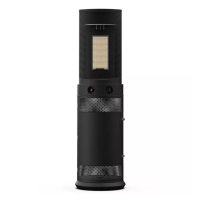Mimosa Backhaul Help Content
Mimosa Backhaul Troubleshooting Guide
Copyright © 2014 Mimosa Page 203
Low Signal-to-Noise Ratio (SNR)
The signal-to-noise ratio (SNR) is the single most important indicator of link health. It represents the magnitude
difference between the Rx power and Rx Noise, which is positively correlated with the modulation coding scheme
(MCS) index. Up to a point, the higher the SNR, the higher the MCS and resulting throughput.
Troubleshooting Steps
Ensure the antennas are optimally aligned to achieve the highest RX power value across the RF link.1.
Ensure line of site between radios is clear of obstructions that may block the Fresnel zone. Obstructions may2.
cause reflections/refractions that appear as noise.
Choose the clearest RF channel(s) available. Interference (noise) on the same frequency can increase PER3.
because the receiving radio does not have sufficient SNR. On radios that support two channels, evaluate the
quality of both channels. Signal quality may be better with one clear channel than with two channels
containing interference.
Select narrower channel widths to increase spectral density.4.
Select a single channel instead of two channels to take advantage of processing gain (constructive gain on5.
B5/B5c).
Evaluate and adjust the Tx power. Tx power that is too low can result in low SNR, while Tx power that is too6.
high can result in distortion (saturation at the receiver). Mimosa recommends setting the Tx power to the level
modeled in the Design application, and then making incremental changes up or down to determine the
optimal level (lowest PER, highest MCS).
Consider installing a higher gain antenna (B5c).7.
Related:
Backhaul Troubleshooting: High PER - Troubleshooting steps for high packet error rate
Backhaul Troubleshooting: Low Tx/Rx Power - Troubleshooting steps for low Tx/Rx power
Backhaul Installation: RF Tuning Process - Overview of how to tune a Mimosa Backhaul link.

